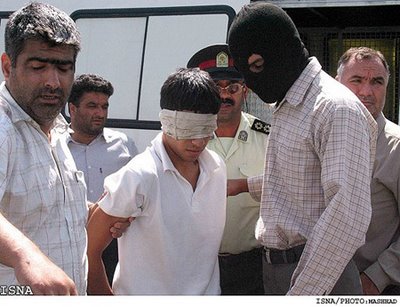 ANKARA, IRAN - Human rights groups are calling for greater protection of gay rights in Iran as the first anniversary of the public execution of two gay teenagers in the country is marked.
ANKARA, IRAN - Human rights groups are calling for greater protection of gay rights in Iran as the first anniversary of the public execution of two gay teenagers in the country is marked.Mahmoud Asgari, 16, and Ayaz Marhoni, 18, were publicly hanged on 19 July last year in Mashad, provincial capital of Iran's Khorasan province, on charges of homosexuality.
Asgari was accused of raping a 13-year-old boy. However, groups like Outrage, a London-based group for the rights of lesbian, gay, bisexual and transgendered people (LGBT), maintain it was a false charge designed to undermine public sympathy for the teenagers.
Activists in Washington, New York, London, Berlin and Brussels marked the anniversary of the teenagers' execution.
David Allison, an Outrage spokesman, said killing the teenagers for what they did together was "absolutely abhorrent".
"To execute people simply because they are gay or have had gay sex just isn't acceptable in the 21st century," he said.
Philip Braun, secretary-general of the International Lesbian and Gay Association (ILGA), condemned the continued threat of the death penalty for consensual same-sex acts between adults in Iran.
Braun, speaking from Bonn in Germany, said the "barbaric punishment" for homosexuality - still used in nine countries including Iran - contravened the findings of the UN Commission on Human Rights and UN Human Rights Committee.
"We call on the Iranian government to respect the human rights of its people regardless of sexual orientation or gender identity," he said.
But members of the LGBT community continue to face discrimination, harassment, abuse, torture and death at the hands of the authorities in Iran.
The surveillance of gay meeting places, raids on private homes, arrests by regular police and Basiji (religious police) was common, with the internet and phone wiretaps used to entrap homosexual men, according to Human Rights Watch (HRW).
Scott Long, director of the watchdog's LGBT rights programme, said when homosexual people were arrested in Iran they were tortured.
"Sometimes the torture is the result of a criminal sentence [usually floggings]. Sometimes they are beaten severely or sexually abused in pre-trial detention," he said from New York.
Women whose sexuality did not conform to heterosexual norms also faced the death penalty, domestic violence and forced marriage, psychiatric and medical treatment.
Arsham Parsi, secretary of human rights affairs for the Persian Gay and Lesbian Organization (PGLO), said the situation left gay men with no option but to hide.
"There is no room for rights as their mere life is threatened by law," he said from Canada.
"They can not report the abuse because they will have to state that they're gay, and that calls for harsh punishments and death."
In a letter to the United Nations, PGLO said that under Islamic law the penalty for sexual relations between two men was death, with a judge deciding the method of execution. The options included stoning, hanging, hurling from a height or death by sword.
"This brutality occurs within the Islamic regime of Iran, while the agreement of social and political rights of the world organisation [the UN] has banned torture and execution punishments for consensual relations between adults," the letter read.
It added that under Islamic law there was no boundary between "sexual abuse" and "homosexual relations", warning: "What we are highly concerned with and urgently ask from you is that a ban be placed on the execution of homosexuals and legal protection be provided to them in Iran."
Long said it was important that the attention focused on the Mashad case did not detract from the broader pattern of abuse suffered by LGBT people in Iran.
PGLO and Outrage believe that up to 4,000 lesbians and gay men may have been executed since the Iranian revolution in 1979.
In total, an estimated 100,000 Iranians have been put to death during the past 27 years of clerical rule including women who had sex outside of marriage and political opponents of the government.
from Reuters
No comments:
Post a Comment